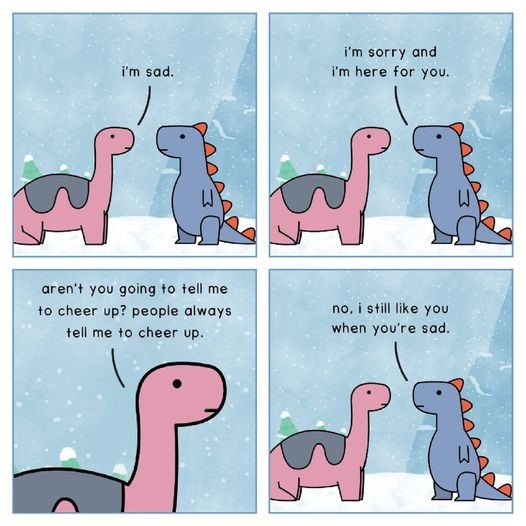
“My elderly mother is so negative”. Have you ever thought that? Perhaps it seems like she’s always complaining. That she’s quick to see the negative side of things and never the positive.
Sometimes being negative is just a habit or perhaps a way to get attention. In many cases though, that negativity is a sign of depression.
Supporting someone with depression can be difficult, overwhelming, and confusing. There are ways to help, but sometimes they’re not the ones that you expect.
In this post, we’re specifically focusing on the caregiving situation. Perhaps you’re supporting an aging parent with depression or even a spouse. Such situations aren’t uncommon.
Indeed, depression is a common problem in seniors, with around 6 million people aged 65 and above suffering from the condition. Yet, shockingly, only around 10% of depressed seniors ever get treatment.
So, let’s talk about what you can do when a loved one is depressed and, just as importantly, what you shouldn’t do.
Depression in Seniors
First thing first. Depression varies dramatically from person to person. Some of the symptoms are obvious, like sadness or crying, a sense of hopelessness, and sleeping too much.
For example, a depressed person might spend more time sitting around doing little, may stop hobbies they’ve had for years, and might take care of themselves less than normal. So, if you’re thinking my elderly mother is so negative, then depression could easily be part of the reason.
There are other symptoms too, like the following. Some of these should be familiar, while others may be unexpected.
- Increased anger or irritability, especially in men or in seniors. This could show up subtly too, like the senior snapping at you more often or being quick to find fault.
- Differences in weight and/or appetite. Depression affects eating in many ways, leading to people eating too much, too little, relying too heavily on comfort food, or perhaps skipping meals. Such patterns can easily cause weight changes, particularly because some people move less when they’re depressed too.
- Sleeping changes. Some people have trouble sleeping when they’re depressed, while others want to sleep much more often, perhaps sleeping longer at night and napping during the day.
- Sadness, including tearfulness. However, be aware that some people with depression aren’t noticeably sad – and many experience plenty of moments where they are happy.
- A sense of being numb, where it’s difficult to enjoy oneself or feel much of anything.
- A lack of interest. This includes decreased interest in life itself or in activities that the person once enjoyed. And, even if the person does these activities, their enjoyment is often decreased too.
- Forgetfulness and lack of attention. It’s easy to see forgetfulness as a sign of age, but it can sometimes be linked to depression instead.
- Fatigue, which can lead to sleeping more or the senior having less energy for tasks.
Why We Often Hurt Our Loved Ones, Rather Than Helping Them

So, what do you do when someone is depressed or always negative?
For most of us, the default response is to try and make them feel better. Perhaps you remind them of all the positive things in their life or suggest they do something that will make them feel better, like going for a walk.
But, while these approaches are logical, they’re not very helpful. They could even be dangerous in some cases.
Let’s look at why this is, followed by what we can do instead.
Depression Isn’t a Response to a Situation
The book jacket for The Hilarious World of Depression by John Moe has this to say about depression:
“… depression is not an emotional response to upsetting events. It’s a mental illness that distorts reality and claims lives.”
This distinction is crucial. Depression literally changes the way a person experiences the world. They see things through a different lens and often experience intense emotions, a pervasive numbness, or perhaps both.
It’s not surprising then that reminding a person of the good things often doesn’t work. Knowing that their life is objectively good or that their fears aren’t true isn’t enough to change the emotions of depression.
You’re Invalidating Their Experience
Depression is difficult, overwhelmingly so. It can feel like a heavy weight, where everything that once made you feel good no longer has that effect. Some people feel sad, others bored, frustrated, numb, or some other combination of emotions.
Trying to force people to feel happy is a little like whitewashing over what they’re feeling.
While the emotions of depression might not make sense to you or to your loved one, they’re there. They’re what is happening and they can be rough.
You May Make Them Feel Worse
There’s another side effect too. By wanting people to feel a particular way, you make it seem like they’re somehow less when they don’t.
And honestly, many loved ones are quite aggressive in how they ‘help’, like constantly pushing the depressed person to have a shower, to go to therapy, to get some exercise. I’ve been on the receiving end of approaches and they made life so much worse for me.
Remember, people with depression are often deeply unhappy with themselves anyway. Your mother or father may already think that they’re a failure – that they should be able to do the simple things and that they should feel better.
Reinforcing that sense of failure, even a little, isn’t helpful.
Here’s a more powerful idea – love them anyway. As they are, where they are… whatever that looks like.

Image from Dinos and Comics
You Might Be Toxically Positive
Have you heard about toxic positivity?
As VeryWell defines it, toxic positivity is “the belief that no matter how dire or difficult a situation is, people should maintain a positive mindset.”
That might sound like a good thing. After all, we know that being optimistic and thinking positively can have many benefits. But, not when being positive is all we do.
The focus on always feeling good negates the more challenging emotions, pushing them under the carpet, and plastering a fake positive aspect over the top. When people do this, they often don’t deal with their challenging emotions or the situations that cause them.
You’ll Burn Out
Have you ever tried to fight a hopeless battle? It’s exhausting, honestly. You’re putting all this time and effort in, but aren’t getting much or anything out of it. This is exactly what happens when you’re always looking for solutions for someone else’s depression.
Burnout isn’t something to take lightly either.
If this happens, you might find that you’re more reactive and have less to give. Burnout also puts you at risk for depression. To avoid the same trap as your loved one, you need to be careful and take care of yourself.
We’ll talk about how to do so further on in this post.
You Can’t Talk Them Out Of It
One feature of depression is strong emotions that don’t necessarily match what’s going on. For example, if your mother is always negative, she might regularly complain about things that aren’t a big deal or find problems everywhere.
I’ve been on that journey myself and it’s… strange. Imagine knowing that everything is fine, good even, but feeling like the world is caving around you, that everything is too difficult, too overwhelming. Sometimes no amount of logic can get you out of that emotional trap.
Depression Is Much Harder Than It Seems
Many of the apparent solutions for depression seem easy enough. Eat better, exercise more, be engaged socially, have direction or purpose to your life, lose weight, get engaged in activities…
But, when you’re in the middle of depression, most of those things seem impossible. Some days, getting out of bed, having a shower, and eating a meal is a huge achievement. Going beyond that may not be realistic at all.
Plus, most of the things that help with depression do so gradually over time. They have a cumulative effect rather than an immediate one. Maintaining habits like these without immediate payoff is difficult enough for the general population. For people with depression, the challenge becomes that much bigger.
The Solutions Mightn’t Be What You Think
There are plenty of commonly recommended ways to help with depression.
- Social connection
- Eating well, including probiotics for gut health
- Meditation
- Mindfulness
- Self-care
- Focusing on the positive
- Therapy
- Medication
- Supplements
- Getting enough sleep
- Exercising
- Setting goals
The author Johann Hari has an excellent book called Lost Connections, which we’ve reviewed on this site. He touches on many familiar ideas, along with some new ones.
These approaches are all helpful. You might be able to help your loved one with some of them, like cooking healthy meals for them or going for walks with them.
But, don’t think that they’re the be-all-end-all. Some people do everything on that list and they’re still depressed.
You can’t know what things will help your loved one and what won’t. They’ll need to figure that out. And, sometimes, the answer isn’t what anyone expected. Some people even spontaneously recover from depression or do so after a single sudden insight.
Instead of thinking that the person will get better if they do X, why not encourage them to explore? To see what helps.
What You Can Do Instead

The first thing to realize is that you can’t fix your loved one. You can’t get them out of depression. That’s their job – and it’s a huge one.
Seriously, there’s a ton that we don’t understand about depression, including why it persists and how to treat it.
Some people do get better, many do. This is often by following the common recommendations, like eating well, exercising, being more socially engaged, talking to a therapist, and perhaps taking medication.
But, plenty of others do everything ‘right’ and the depression persists, or it goes away for a while and then comes back. There are countless examples of people who seemed to have a perfect life and were living well, yet suffered from crippling depression.
It’s difficult for anyone to find their own way through depression, to learn the techniques that work for them, and to find their way through their own mind.
Your job isn’t to be their guide, but to support them. To have their back.
Be In Their Corner
Don’t try to fix things.
Seriously. Telling someone that they shouldn’t feel X and should feel Y instead isn’t just rude, it’s also incredibly unhelpful.
And, as we’ve already discussed, you can’t possibly know what will help them. You can suggest and encourage, by all means, but drop the idea that if they ‘just did this’ they would get better.
Instead, lean into compassion. Be aware that they’re struggling and approach them without judgment. If they tell you what they want or don’t want, respect that. Depressed or not, they have the right to self-determination.
Simply being there for someone might sound passive.
You’re not fixing anything – but that’s the point. Fixing things isn’t your job, it’s theirs.
What you can do is be there when they need you. Keep the door open. Check in often to see what they need. If they’re struggling to eat, don’t berate them. Perhaps you can bring them food instead?
Trust Them
When someone is depressed, there’s only one person who truly knows how they feel – themselves. No matter how close you are to your loved one, there’s plenty that you don’t know.
So don’t try to tell them what they feel or what they need.
Seriously.
You might make suggestions, like ‘have you thought about talking to someone?’ or ‘would you like to come for a walk with me?’, but don’t start down the road of ‘you should get out more’ or ‘you need to try harder.’
Telling someone what they should do isn’t just rude, it’s also ineffective. Even if you’re right, many people get immediately defensive when they’re told what they should be doing.
Listen To Them
Giving people a shoulder to cry on can be powerful. This can be as simple as listening to what your family member has to say, without turning the whole thing into an argument.
If what they have to say seems harmful to you or them, rather than arguing, why not change the topic?
Let’s take your elderly mother being negative as an example. Most of us would try to debate back, pointing out the positive things in her life. But, depression affects how a person feels and you can’t change that by saying their emotions are wrong. Instead, you could switch to a more productive line of conversation – perhaps by saying “let’s talk about something different.”
Invite Them Out, Check in on Them
Being remembered and considered is a huge deal when you’re depressed. Such actions, even when they’re small, make it feel like you haven’t been forgotten. That you’re loved. That you matter.
There’s a trick to doing this though.
Whenever possible, make any invitations casual and without pressure.
You’d love them to come, but if they can’t, no worries, there’s always next time. And, if they do come, but need to leave early or aren’t very social, that’s okay too.
When people are very depressed, they might refuse most invitations. Try not to stress about that. Getting them to go out with you is a bonus. You’re still helping them even if they so every time.
Keep Them Company
Depression and loneliness often go hand-in-hand, which is a serious issue – as each makes the other worse.
The problem isn’t surprising, as depressed people tend to withdraw. They don’t want to be around others, don’t have the energy for conversations and often aren’t good company.
One way to help is to simply hang out with them. Be in the same space, even if you’re doing something completely different.
For example, if your mother is always negative and seems depressed, you might visit her regularly and stay for a while – even if you’re just doing your own thing in the corner of her lounge.
Having someone around can help. And, in time, your family member may get more comfortable about opening up to you.
Don’t Take It Personally

Depression often comes with unexpected behaviors, ones that are sometimes painful to be around. These vary between people and won’t always be consistent.
The list below highlights some of the main behaviors you might come up against (although, others are possible too). Being aware of these behaviors can help you to respond with grace.
- Irritability and even anger. These are under-recognized symptoms of depression, but they often show up in men (and sometimes women too). Your loved one may get frustrated faster than normal, may be more likely to snap at you, or to make assumptions.
- Shutting people out. People with depression sometimes shut down entirely. Some may get to the point that they refuse to talk and even look at you.
- Being negative. Your loved one might be negative about their life and even about you. This can be hard to listen to sometimes, but remember, depression alters a person’s reality. Their negativity is a reflection of their internal experience. It isn’t directly related to you or their life.
- Sudden mood changes. Depressed people can experience a wide range of emotions and may swing dramatically from one to another. They may not even realize that they’re doing so, as each new set of emotions feels real while it is happening.
- Being inconsistent. Depressed people sometimes end up very ‘in the moment’, as it’s hard to think beyond what they’re feeling right now.
- Being selfish, in many ways. Depressed people often come across as selfish, but self-protective may be a better word. If someone is struggling and barely has enough energy for their own life, they certainly don’t have much to give others. Most of us have been there at some point, where there’s so much going on for us that we don’t have anything left to even think of others.
There may be multiple reasons for these effects. One is that depression distorts one’s perception of the world, making it harder to enjoy life and see the positive things. It’s easy to see how this would flow onto a person’s relationships.
Plus, when you’re depressed, everything feels more difficult.
Sometimes it takes a person all the energy they have just to do the simple things, like eating and getting through the day. They don’t have enough left to do well socially too.
They might not even have the energy to care about how you feel. That sounds horrible, but remember, depression is an illness – a serious one. Suffers aren’t being intentionally selfish. They’re protecting themselves.
Have A Sense Of Humor About It
Depression doesn’t always need to be dark, heavy, and serious. It has a funny side to it too.
There are some fantastic authors and podcasters that take this approach – like John Moe who runs The Hilarious World of Depression and has written a book with the same title.
I read Furiously Happy by Jenny Lawson when I was low. That book is seriously all over the place, but it helped me to stop judging myself and to find my feet in life again.
Take Care Of Yourself
Finally, don’t forget about your own needs.
It’s tough to be around someone with depression – especially when things don’t seem to be getting better. You’ll only be able to do it if you take good care of yourself.
This includes pursuing your own interests and taking space when you need it. Doing so might sound selfish, but it’s crucial. Otherwise, you risk falling into depression yourself.
And, if you’re struggling, you won’t be much help for your loved one.
What If They Do Need A Push?
Being supportive and positive works well most of the time. Doing so doesn’t fix what the depressed person is feeling, but, you’re giving them the space and support they need to grow themselves.
Of course, doing so won’t always be enough.
It’s easy to get lost in depression and people do sometimes need a push to get out. Many of the strategies for having difficult conversations apply here, including being compassionate, staying on task, validating them, being specific, and connecting with them emotionally.
And, once again, don’t use ‘should’ language or try to make them feel guilty. Those are never great ways to promote change – especially not in someone you love.
Final Thoughts
I struggled with depression for a long time myself, perhaps ten years or more. During that time many well-meaning people in my life wanted to help and tried to. But, they largely did so by trying to ‘fix’ what I was feeling, which often meant trying to push me into doing all those things that should help.
They weren’t wrong. Much of my recovery did come from the areas you might expect, like therapy, eating better, exercising, forming new friendships, being social, and so on.
Those solutions, however, had to come in my timing, no one else’s. And, everything was very much little by little, one step at a time. Many people would have thought that I was being lazy, indulgent, and not trying, but the only way I could make positive changes stick was to do them very slowly.
I experienced the most growth via a friend who taught me to be kind to myself. Who didn’t judge me if I couldn’t leave the house or didn’t want to eat. Who would literally bring over pizza so that I could feel better and let me talk and cry, even about nothing.
For me, and I suspect for many others, that kind of love and support is critical to getting better. It’s hard to grow when the people around you are focused on what you’re not doing, without seeming to see how difficult it is to simply get out of bed each day.
And honestly, if you’re so depressed that getting out of bed or having a shower seems impossible – someone telling you to go for a walk or go to the gym is frustrating and insulting. Many depressed people know what they ‘should’ be doing anyway. Most of the time they need support much more than they need advice.
Feeling Overwhelmed?
Check out our Caregiving Consulting service for personalized support and guidance.


Leave a Reply